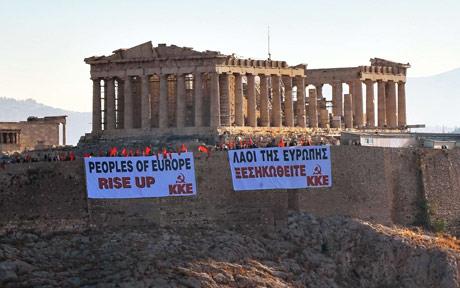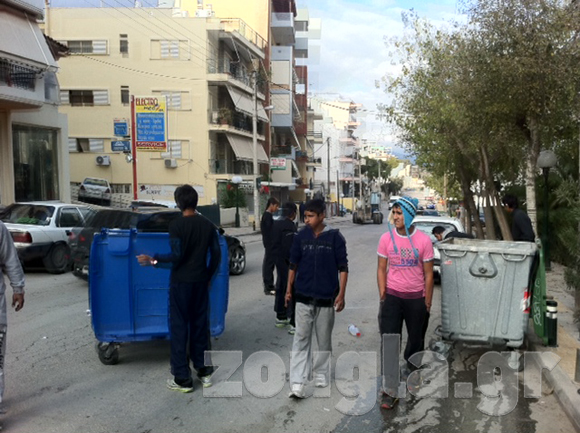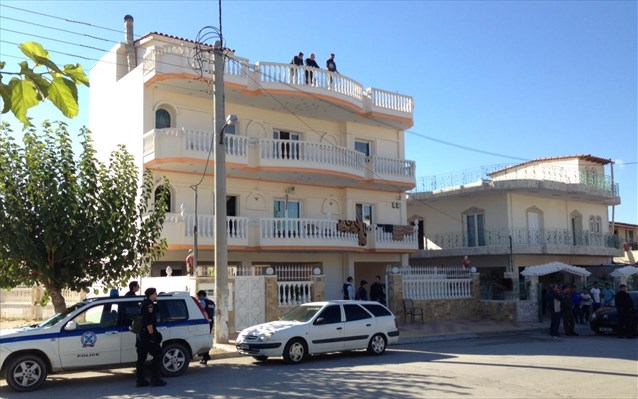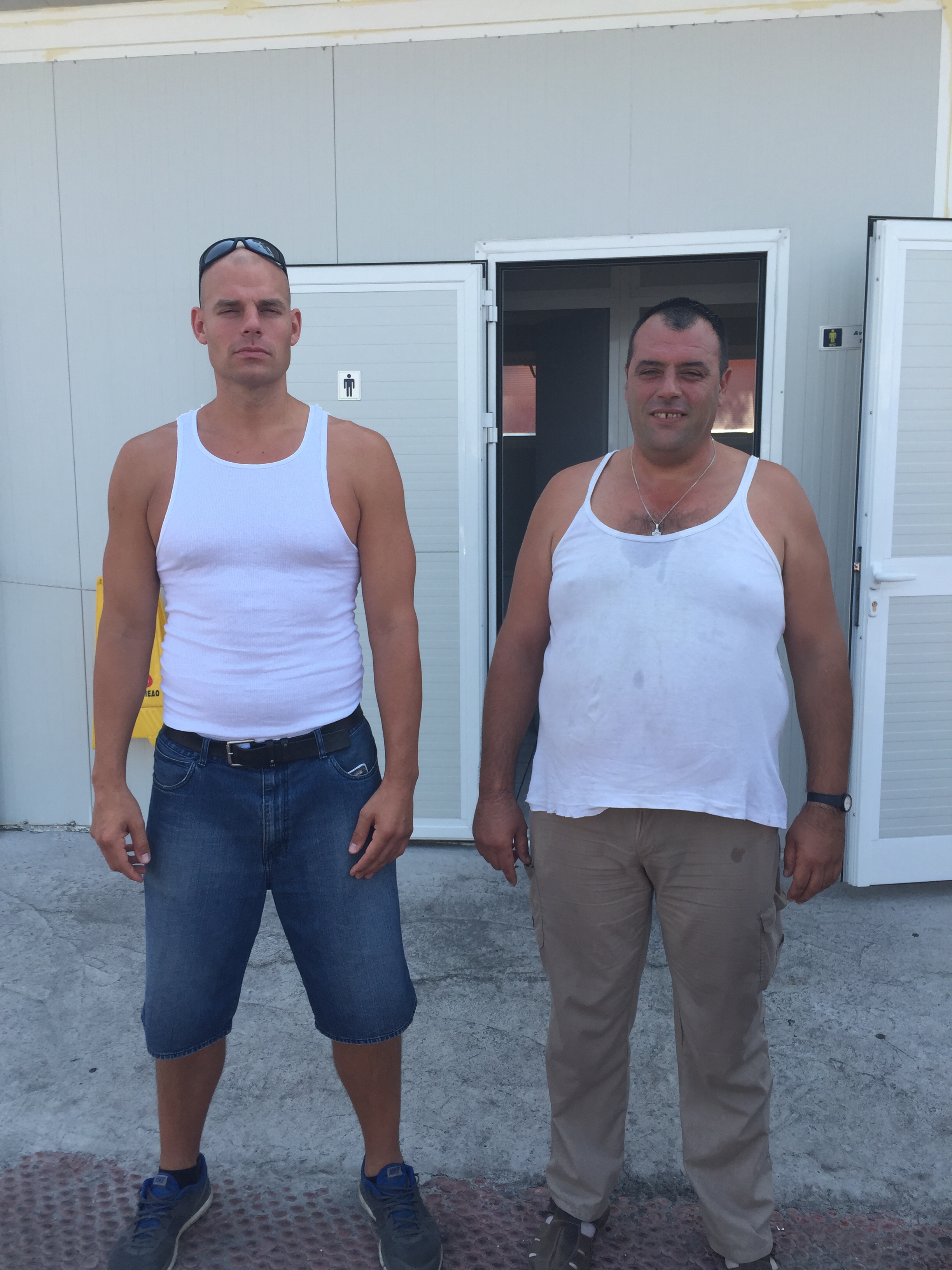Menidi is an area of Athens most visitors to Greece do everything in their power to avoid. Also known as Acharnes, Menidi hosts the largest Romani community in Greece and is infamous for being the center of the heroin trade.
Bus Drama
I did not know at the time that the bus ride from the number two metro station to the periphery of Athens would be the heart of my adventure. A group of unaccompanied, Romani children boisterously took the back of the bus over. Lighter skinned grandmother figures reasoned with the darker-skinned children and affectionately tried to calm them down. They gave the ten and twelve year olds candy and told them not to climb on the seats. Outside on the street, a few dozen darker skinned families with suitcases and a host of other belongings spilled out of the train station. Were these also Romani families? No. These were Syrian refugees chased from their homeland by the U.S./NATO proxy war against a sovereign Syria. The Romani youth —picking up on the fact that this was a group of people down on their luck and also classified as a “social other”— shot off the bus and danced around the families in mocking gestures.
Ironically, the displaced Arab families and the descendants of ancient Indian immigrants shared a skin complexion different than the Greek citizenry, which placed them both on the margins of Greek society. This was perhaps all they shared. One people at the bottom of the social totem pole had stumbled upon another, positioned even lower in the pecking order. As the number forty six bus pulled off, the children scampered back onto the bus out of breath, having one whale of a time at the expense of Greece’s newest arrivals.
As the bus made its way north —further away from the downtown district— several young men hopped on the bus. Like almost everybody else on the packed bus, they sailed by the driver without making any motion to pay the fare. The driver soon objected to the collective non-compliance and grew frustrated when his pleas were ignored. He stood up and argued with the young men who showed their empty pockets. The driver tried to throw them off. He threatened to call the police but soon gave up. Our journey recommenced.
Several stops later, a non-uniformed agent appeared on the packed bus. He requested to see everyone’s ticket. Several members of the crowd protested because he was not in uniform. There was yelling back and forth. The agent ignored the bickering and demanded to see my ticket. I was among the freeloaders taking the bus around Athens without paying. He switched to English to tell me I had to pay a fine sixty times the price of the fare. He called the police. The bus came to its next stop. Suddenly two young men, accused of the same infraction, darted off. The agent screamed after them. For a split second, he vacillated between my crime and theirs. He chose the path of most resistance and chased after the sprinting men, yelling at their heals. I sank back into my seat, relieved that the other two men’s entanglement with justice had got me off the hook.
“Are you an addict?”
The trip to Menidi constituted a heroin corridor that rivals Hunts Point in the Bronx or Fitchburg, Massachusetts in terms of that down-and-out heroin den-feel. It was the ninth circle of hell. The addicts dotted the bus stops, the train station and the local streets. Those who were at one time human beings were now dehumanized, toothless, and (self) mutilated hunchbacks. They drooled on themselves as they strolled back and forth hustling, peddling, searching and fiending. Accustomed to rejection, they only interacted with one another, bumming a cigarette or a drink from a co-conspirator in the struggle. I followed the trail of addicts to see where it would take me.
The neighborhood of Menidi was quiet and uneventful. Romani youth and young men wore purses around their waists. On two occasions, several Romani teenagers approached me to ask for a cigarette. I imagined this was their way of evaluating if I was in need of anything. They were purportedly the suppliers. The addicts were committed to this daily hike because the dealers in Menidi undercut the downtown €40 euro rate for a gram of heroin and slashed that price to as low as €10 euro. I walked expecting to find further marginalization but besides the drug market -who came from outside- there was none. Once again, the Romani people had been stigmatized and vilified by the outside world. Like the Jews (originally) and the Kurds, the Roma have been denied a homeland and have been forced to adapt and survive as they can in hostile territory across Europe.
English-speakers were tough to come by. My questions sparked rival questions; “Why did you come here? What are you looking for?” They checked my arms for tracks; “Are you a drug addict? You don’t look like one.” I chided back: “What do you want me to do, stay at the Acropolis for four more days?” The Acropolis —that gathering ground of the elites of the day, democracy for one class, enslavement for another— held my attention for two hours the previous day. These ancient wonders of the world have been converted into the epitome of selfiedom, with tourists jockeying for the best shot they can post on social media. I continued my self-righteous rant: “If I didn’t come to visit you guys, I would have went crazy or left Greece. I want to see how people live in Athens.” Besides the Parthenon and the lush islands to the south, Athens appeared to be a rough city with little to interest the tourist.
Sisa: Greece’s Crack
A group of local Greeks, sitting at an outdoor restaurant having a midday drink, looked incredulous; “You got bored but you are not looking for heroin?” A less judgmental gentleman corrected them: “They are not fucked up on heroin. It’s sisa.” Addicts smoke sisa —a sort of Greek crystal meth— out of a glass pipe. It has been called the cocaine of the poor because the toxic additives dilute the cocaine content and an addict can score it for two dollars. A local merchant with a good command of English introduced himself as Nicos. He was the perfect informant. I asked why the big hullabaloo about a community that looked more picturesque than many neighborhoods in downtown Athens? He claimed that the neighborhood looked relatively peaceful from outside but if I saw the inside of the Romani homes, I would see the despair. Having just walked these very streets for hours, I remained unconvinced.
Two toothless, burley, moussaka-bellied enforcers strolled up to me.[1] Their faces were hardened. Their dress was sloppy. They wore no expression on their face. Between them, they carried a solid 600 pounds. They were testing me. I stood my ground. They let their guard down and playfully measured their height with mine. The expectant crowd let out a collective gasp and everyone laughed. They asked if I was a soldier in the U. S. Army. When they learned that I was not, they then asked me “Well what is your business, basketball?”
“Fuckin gypsies!” Nicos translated the two hitmen’s words for me: “Pick-pockets, good-for-nothing thieves. Don’t go in there. They will kill you. They will steal from you and leave you naked.” Now I knew I had to penetrate deeper into Menidi. But the further I penetrated the off-limits neighborhood, the more “normal” things looked. The Romani had their own community with the usual commerce and coming and goings that one would expect. “The junk” that attracted outsiders to the edge of the community was where the story was.
If I had listened to the local scuttlebutt, I would have never wandered into these neighborhoods. But when do I ever listen to prevailing judgement? As I predicted, the journey into the heart of this highly-feared ghetto was anticlimactic.
This is the social training of oppressed people. To fear your neighbors is to fear yourself. The slum down the road is the closest thing to hell yet where they live is more often than not a mirror reflection of the very fears they espouse. This seemed analogous to how Greek society viewed the Romani. But the Romani were not the social group responsible for this plague.
Full Circle
Unemployment is soaring in Athens. It is 25% overall but even higher for Greek youth.[2] Over the past seven years and particularly in the past three months, Athens emerged as the epicenter of global resistance. Millions of Greeks mobilized against the recolonization of their country by German capital. Politicized youth battled addicts and dealers for hegemony over different neighborhoods. The war on the poor has given rise to two contradictory social phenomena at war for Greece’s soul; self-mutilation and rebellion. Do the most alienated rise to the historical occasion or do they fall by the wayside swept into history’s gutters? This is the Greek drama that is playing out. Internationalists await the denouement and play their roles in other unfolding plots.
When I waited for the bus back, there was a steady stream of Gadjo (non-Romani) customers –with swelling sores on their faces and limbs- making their way back to commercial Athens. A group of gruff looking men sized me up and positioned themselves close to me. I could not help feeling like they might be measuring me up to pick my pockets. I leaned against the bus wall so I could face them. After moving full circle for this snapshot of the unknown, I returned to the graffiti-lined streets of downtown Athens. I saw many of the very same addicts that I took the trek with. They were begging and hustling in Syntagma Square, Athen’s Times Square, in order to repeat the journey. Again no one paid the bus fare. As we exited off of the last stop, I asked a group of women why no one paid. To the amusement of her group of friends, one woman offered the following hypothesis, bellowing out “Because this is the fuckin’ bus!”
[1] Moussaka is a sort of Greek lasagna.
[2] “Sisa: Cocaine of the Poor.” Produced by Vice.








see how much your writing has improved? well done bro’ one small point: Masouka is a sort of Greek lasagna. it’s moussaka – alan
>
I admire the fact that nothing was sugar coated in a sense when talking to the children. It was eye opening story.
Professor Shaw, you have to places that would never pass my mind to visit. On the other hand, because of your adventures, we see the world through your eyes and understand the silimilarities among the low poor class that society seems to forget. Being a dark skin Romani and a refugee in a country that barely recognises that you exist must be very depressing. Living an area where a meth like drug is the breakfast, lunch and dinner for many is a struggle. These people have no identity and no one cares for them. Drugs and society has degraded their humanity. The elites and the rich always live the good life and ignore those in need. What can society expect from the forgotten, they have to and need to hustle in order to survive or keep up with their drug habits. Sadly, ghettos are everywhere in the world and they are not any different from one another. The government is as corrupt in Greece as it is in many similar countries. If their is someone to blame for such tragedy, it has to be society and the government.
I along with the many survivors of violence perpetrated by Romani in our societies do very much disagree.Anti social behavior is a choice. Parents do have responsibilities towards their children and raising them to steal and murder is the choice these Romani parents make.Everywhere in the world, there ate patents who.may be poor but they decide to live decently and to teach their children to get along with others.Romani communities in Turkey, Germany, UK, refuse to cooperate with local people, they are deliberately disruptive.Thank God some do educate their children and these educated Romani accept law and order.
I think globally there are places where people will generally tell you to stay away from because of the stereotypes that plague marginalized groups. The ghetto in Athens sounds no different than the ones in New York or Puerto Rico, but because of the the economic crisis happening in Greece race relations will continue to go downhill. The bus drama is the equivalent of kids being arrested for hopping the train, the women laughing at the end shed light upon how the privilege of the western world brain washes us into believing everything should be paid for by the people instead of those in charge. Something as simple as transportation could be a financial struggle and an act of protest could be something simple like “I’m not paying cause I’m broke.”